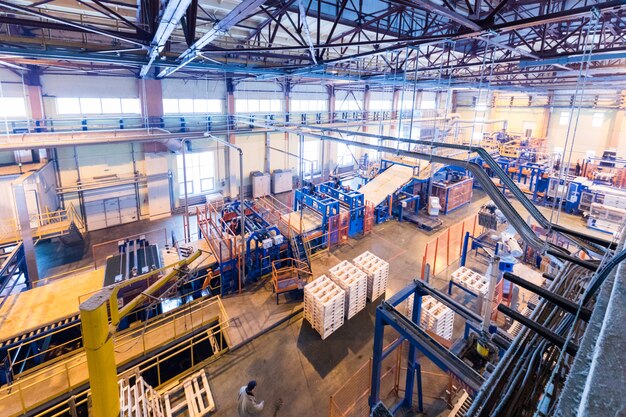Starting and running a manufacturing business in Botswana can be a rewarding venture, contributing significantly to the country’s economic development and job creation. However, like any business in Botswana, manufacturing enterprises are subject to a range of compliance requirements that ensure smooth operations, adherence to laws, and the protection of both the environment and consumer interests.
In this comprehensive guide, we will explore the various compliance requirements that manufacturing businesses in Botswana must meet, from business registration and environmental regulations to health and safety standards. Understanding these requirements is crucial for business owners to avoid legal pitfalls and operate in a lawful, sustainable manner.
Key Compliance Requirements for Manufacturing Businesses in Botswana
1. Business Registration and Licensing
Before operating any manufacturing business in Botswana, entrepreneurs must ensure they are legally registered. This process includes the following steps:
- Company Registration: Manufacturing businesses must be registered with the Companies and Intellectual Property Authority (CIPA). This includes deciding on the type of business entity (e.g., private company, partnership) and filing the appropriate documents with CIPA.
- Trade Licenses: Businesses involved in manufacturing may also require specific trade licenses from relevant local authorities depending on the type of goods they produce. A trade license serves as formal authorization to operate within a specific area and comply with zoning regulations.
- Certificate of Incorporation: After completing registration with CIPA, manufacturers will receive a Certificate of Incorporation, which legally permits the business to operate.
2. Taxation Compliance
Manufacturers in Botswana are required to comply with various tax regulations, including registration for taxes and adherence to tax payment deadlines. Key taxes applicable to manufacturing businesses include:
- Value Added Tax (VAT): VAT is applicable to most goods and services in Botswana, and manufacturers must be VAT-registered if their turnover exceeds the VAT threshold. VAT-registered businesses must collect VAT on behalf of the government and submit VAT returns periodically.
- Income Tax: Manufacturing businesses must also comply with Botswana’s income tax laws. The Botswana Unified Revenue Service (BURS) is responsible for administering income tax, which includes corporate income tax on profits. Businesses are required to file annual tax returns and pay the necessary taxes within prescribed deadlines.
- Withholding Tax: For manufacturers dealing with certain payments to non-resident entities (such as royalties, interest, and dividends), withholding tax requirements may apply.
Proper tax filing and payments are essential to avoid penalties, fines, or potential business shutdowns due to non-compliance.
3. Environmental Compliance
Manufacturing processes often involve the use of raw materials, chemicals, and energy, which can impact the environment. Therefore, businesses must adhere to environmental protection laws to reduce negative effects. Key environmental compliance regulations for manufacturing businesses include:
- Environmental Impact Assessment (EIA): Manufacturers planning to establish or expand their operations must conduct an EIA to assess potential environmental impacts. This assessment is required under Botswana’s Environmental Impact Assessment Act and must be approved by the Department of Environmental Affairs (DEA). The EIA process helps ensure that the business’s operations will not cause undue harm to the environment.
- Waste Management: Manufacturers must develop and implement proper waste management systems, which may involve the safe disposal or recycling of industrial waste. Botswana’s Waste Management Regulations set out requirements for handling hazardous and non-hazardous waste, ensuring that businesses protect the environment and public health.
- Air and Water Pollution: Manufacturers in Botswana must comply with laws that regulate emissions into the air and effluents into water bodies. The Environmental Pollution Control Act mandates monitoring of emissions and discharges to minimize environmental damage.
4. Health and Safety Compliance
The health and safety of workers is a top priority in any manufacturing environment. As such, manufacturers must ensure their operations adhere to Botswana’s occupational health and safety regulations. Key compliance areas include:
- Occupational Health and Safety Act (OHSA): Under the OHSA, manufacturers are required to provide a safe working environment. This includes controlling hazards such as chemical exposure, machinery accidents, and physical injuries. Manufacturers must conduct regular risk assessments and implement control measures to mitigate potential hazards.
- Workplace Safety Training: Employees must receive training in safety practices, including how to handle equipment, use protective gear, and respond to emergencies. Manufacturers are responsible for maintaining first aid kits, fire extinguishers, and emergency exits in the workplace.
- Health and Safety Inspections: The Botswana Labour Department conducts regular inspections to ensure that businesses adhere to health and safety standards. Failure to comply with these regulations can lead to fines, suspension of operations, or legal action.
- Insurance Requirements: Manufacturers may also need to secure appropriate insurance coverage, such as worker’s compensation and liability insurance, to protect both their employees and the business.
5. Product Standards and Quality Control
Manufacturers in Botswana must adhere to national and international product standards to ensure the safety and quality of their products. Key regulations include:
- Botswana Bureau of Standards (BOBS): BOBS is responsible for developing and enforcing product standards in Botswana. Manufacturers must ensure that their products meet BOBS standards for quality, safety, and performance. This includes obtaining certification for specific products, such as food, chemicals, and electrical equipment.
- Product Labeling and Packaging: Certain products may be required to include specific labeling or packaging information, such as ingredient lists, warnings, and expiry dates. These requirements aim to protect consumers and ensure product traceability.
Failure to meet product standards or quality control regulations can result in fines, product recalls, and damage to the business’s reputation.
6. Employment Law Compliance
Manufacturing businesses must comply with Botswana’s employment laws to ensure fair and lawful treatment of their employees. Key regulations include:
- Labour Laws: Manufacturing businesses must adhere to the Employment Act and other labour-related legislation, which cover areas such as wages, working hours, overtime, leave entitlements, and employee termination procedures.
- Employment Contracts: Manufacturers are required to provide written employment contracts to their employees, outlining terms of employment, job responsibilities, remuneration, and working conditions. These contracts ensure that both employers and employees understand their rights and obligations.
- Unionization and Workers’ Rights: Employees in the manufacturing sector have the right to form unions and engage in collective bargaining. Manufacturers must respect these rights and adhere to processes outlined by the Trade Disputes Act.
7. Import and Export Regulations
If a manufacturing business imports raw materials or exports finished products, it must comply with Botswana’s import and export regulations, which are managed by the Botswana Unified Revenue Service (BURS) and other relevant authorities.
- Import and Export Permits: Manufacturers must obtain the necessary import and export permits to move goods across borders. This includes ensuring compliance with customs regulations, tariffs, and duties.
- Customs Declaration: Businesses involved in importing or exporting must submit accurate customs declarations to avoid penalties for non-compliance with the Customs and Excise Act.
8. Intellectual Property Protection
Manufacturers in Botswana must protect their intellectual property (IP) rights to safeguard their innovations, designs, and brand reputation.
- Patents, Trademarks, and Copyright: Manufacturing businesses are encouraged to register patents for unique inventions, trademarks for their brand, and copyrights for original works under the Intellectual Property Act. This helps prevent unauthorized use or imitation of their products and designs.
Compliance with regulatory requirements is crucial for the success of manufacturing businesses in Botswana. From business registration and taxation to environmental protection and health and safety standards, manufacturers must navigate a range of laws and regulations to operate legally and sustainably. By adhering to these compliance requirements, businesses not only ensure the smooth operation of their operations but also contribute to the broader goals of economic growth, environmental protection, and consumer safety in Botswana.
Understanding and fulfilling these compliance obligations is a key step toward building a reputable, successful manufacturing business in Botswana, positioning the business for growth, sustainability, and profitability in the long term.






